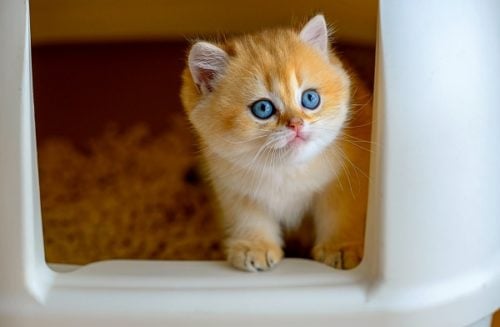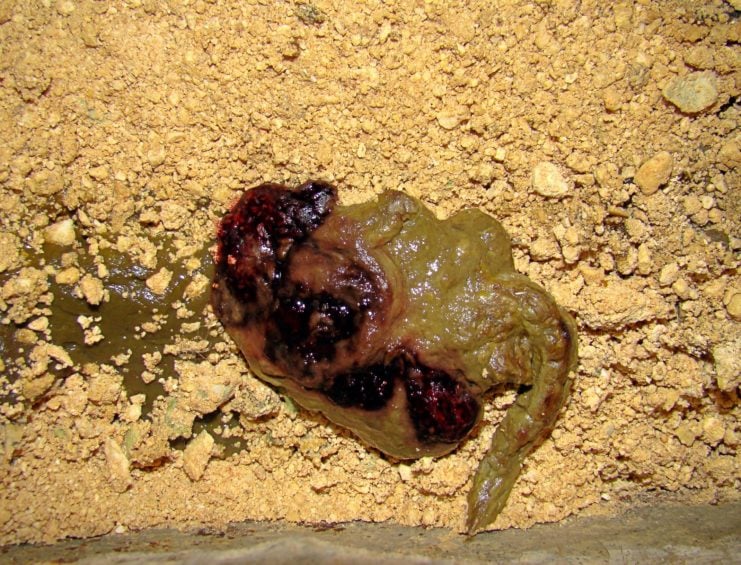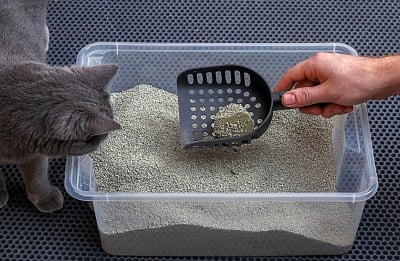How often should my cat go poop? It’s a question that many a new cat owner asks at our vet clinic. Unfortunately, it’s a question that has a possibly frustrating answer. “It depends.” Like all living things, there are many different things that can affect your cat’s bowel movement. But what is normal? What should you be on the lookout to make sure your cat is healthy?
In this article, you’ll learn what affects your cats poop frequency, how often cats poop, cat diarrhea and it’s causes, cat constipation, and what to do if there’s blood in your cats stools.

Table of Contents
- What affects how often your cat goes poop?
- How often do cats poop?
- What should healthy cat poop look like?
- Cat diarrhea
- How do I prevent diarrhea in my cat?
- Cat constipation
- Why do cats get constipated?
- How to deal with constipation in a cat?
- What if there is blood in cat poop?
- A few warnings about cat poop
- FAQ
What affects how often your cat goes poop?
There are a few things that can affect how often your cat poops. For example, how old is your cat, what cat food you feed them, your cats overall health, their environment, does your cat have stress in their life, etc. One or more of these could be a factor in how many times per day your cat goes poop.
Your cat’s age can also make a difference. For example, a kitten will likely have more frequent bowel movements than an adult cat. The type of food, how often you feed them, and how much you give them to eat will also influence your cats regular bowel movement. For example, low quality diets with lots of fillers or ingredients that aren’t easily digested may cause your cat to visit their litter box more often and have larger stools (or even looser stools). We saw this with our first cat when we didn’t know better to purchase high quality food. More frequent and larger stools. Do you have an indoor cat or older cats that don’t get much exercise? This will affect how often your cats poop. Further, if your cat is on any medications or nutritional supplements, or even certain pain medications, they might affect how fast food passes through their digestive tract.
How often do cats poop?
At least once a day. The general rule is that your cat should have a healthy bowel movement daily. Their dry stools should be well formed, brown in color, not too hard or loose, and they should pass it fairly easily.
As you clean the cat litter tray of your cats litter box, please take a moment to inspect what your cat’s feces looks like. If your cat’s bathroom habits start to change from what they do normally, like the consistency, color, odor, or anything else is a cause to get your attention. Watch your cat more closely to see if their litter box habit change goes on for more than a day or two. If you see changes, it’s time for a vet visit as these changes could be indicative of a medical condition.
What should healthy cat poop look like?
While your cats normal bowel movement may be covered in kitty litter, you still want to check it out to monitor the health of your cat. A healthy cat poop should be dark brown in color and not too loose or too firm. If it’s mushy or rock-solid, your cat might be having a digestive or health issue. If it’s watery, your cat is having a bout of diarrhea.
Cat Diarrhea
Diarrhea in cats isn’t as uncommon as you’d think. There are many reasons why your cat might have a case of loose stools. Most often it comes and goes in a day. Other times, it can last longer. It can last for days, weeks, or months, or even come back as a regular thing.
Diarrhea that lasts for one to two days probably isn’t a problem unless you have an older cat or a kitten. If it lasts longer than 2 days, your cat can become dehydrated which can become a dangerous health condition.
Cat Diarrhea can be causes:
- Changes to your cats food. This can be food allergies or intolerance which can happen at any time in a cat’s life. Did you change your cats diet recently? Did your cat eat something that they weren’t supposed to?
- Parasites such as roundworms are a common issue for cats can cause diarrhea.
- Dairy products can also upset your cat’s digestive system. While cartoons on tv show a kitten loving a saucer of milk, it really isn’t good for them.
- Inflammatory bowel disease is a condition where your cats GI tract becomes inflamed. There will likely be other symptoms which will help your veterinarian can diagnose.
- Feline pancreatitis is a potentially serious condition that your veterinarian can diagnose.
As you now understand, if your cat has diarrhea for more than a day or two, we strongly recommend that you take your cat to see your veterinarian to diagnose the cause. Please call your veterinarian right away if your cats diarrhea is black or bloody, also if your cat has a fever, is vomiting, seems sluggish, or is experiencing a loss of appetite.
Your veterinarian’s treatment protocol for your cat depends on the cause their diarrhea. Some cases will need to reduce or control inflammation with prescription medications. Your veterinarian may prescribe a special diet if your cat has a food allergy, inflammatory bowel disease (IBD), or feline pancreatitis. If your cat has a parasite such as roundworms, a deworming medication will be prescribed.
How do I prevent diarrhea in my cat?
To prevent diarrhea in your cat, the best advice we give to our patients is don’t make big changes to your cats diet at one time. Cats unlike humans don’t want or need variety in their daily diet. If you have to change their regular food, add a little of the new to the old. Over time, you can slowly increase the new to old ratio while monitoring how your cat reacts to their new food.
Another tip is not to give your cat dairy products like milk or yogurt. Most cats can’t digest them properly. This is because cats lack the digestive enzymes to digest the lactose in dairy. Yes, that is the same as many humans which is a condition called lactose intolerance.
Cat Constipation
When your cat has a case of constipation, they’ll strain when they try to move their bowels or won’t be able to produce anything for the litter box. Usually constipation isn’t a cause for worry if it only occurs on occasion. But if this condition becomes more common for your kitty, please take your constipated cat to your veterinarian.
Why do cats get constipated?
Constipation in cats can happen for a number of reasons which can include:
- Excessive self grooming. When your cat grooms themselves too much, they can get too much hair stuck in their digestive tract.
- Kidney problems. Your cats constipation because of their kidney disease. This is definitely something you should work with your veterinarian on.
- Feline megacolon. This is a condition where your cat’s colon is dilated and flaccid. The colon absorbs moisture which results in hard, dry stools that can build up in the colon.
- Colon obstruction. Your cat may have an obstruction blocking their colon. Your cat may have eaten a toy, sock, or a bird. This can result in things like fabric, elastic, plastic, or bones get stuck.
- Low fiber diet. Most commercially available cat food are formulated with complete nutrition including fiber. This is often diagnosed in our patients that cook their cats meals themselves.
Please understand this is not an exhaustive list. For example, one of our cats got constipated for a few days. We eventually determined that this was because we had gotten some new furniture. The stress caused by the delivery people, moving things around, the new furniture smell, etc. all combined to stress our poor kitty. Her bowel movement returned to normal after a few days thankfully.
How to deal with constipation in a cat?
Once you’ve ruled out a medical issue, you can try to help your cat with their “backup of poop”. We recommend our patients try to make sure their cat gets more exercise. Also monitor how much they are drinking enough water. This is because the water will help their waste move through their digestive tract a bit easier. You should monitor your cat’s moisture intake if they are constipated to check if your cat is not drinking enough water.
We have also prescribed probiotics and laxatives in some cases. Constipation and the inability for your cat to produce urine (cat pee) are potentially life threatening conditions so please make sure to consult with your veterinarian before trying at home solutions.
What if there is blood in cat poop?

Blood in your cats stool is a concerning sight. It’s not that uncommon and not an immediate time to panic. There may be a simple explanation. For example, the reason your cat may have a bloody stool may be caused by the fact that your cat had a bit of constipation. Your cat may have strained a too much while trying to go. Simple explanation.
However, if blood continues and/or there appears to be a lot of blood, the blood is bright red, or your cat presents other symptoms, please take your cat to your veterinarian. The reason is that your cat may require medical treatment for an infection, an intestinal parasite, cancer, a bowel obstruction, or other potential health issues.
A Few Important Warnings About Cat Poop
Most animals don’t show signs they are hurt, sick, or otherwise not able to defend themselves. This is just part of their natural instincts to protect themselves. While changes in cat behavior are more obvious that something is amiss, problems defecating, urinating, or abnormal cat poop are your potential warning signs. While cleaning their litter boxes, you can get sense of what is “normal” for your cats. Clumping litter may hide things, but it’s hard to miss diarrhea or blood.

Blood in the stool is always something that should get your attention however. If you see blood in your cat’s stool, please bring your cat and a sample of their stool to your veterinarian for evaluation.
If your cats bowel movement appears to be causing them to strain, make sure that they are straining to poop rather than straining to pee. Constipation is an uncomfortable, possibly painful condition that will likely pass (pun intended). However, a urinary obstruction is a potentially life threatening condition. Please take your cat to your veterinarian as soon as possible.
Finally, do not try to give your cat an enema for their constipation. Not only will your cat resist with all their might (and with their claws and teeth), it may also seriously injure your cat. We have had emergencies at our practice due to at home enemas that caused rectal tears. If your cat is constipated for more than a few days, please take them to your veterinarian.
You have learned what affects your cats poop frequency, how often cats poop, cat diarrhea and it’s causes, cat constipation, and what to do if there’s blood in your cats stools. This will go a long way towards keeping a healthy and happy pet cat. And keeping your Pet Happy is what we all want.
FAQ
Question: How often do cats poop?
Answer: Cats should have a healthy bowel movement at least once a day.
Question: What should healthy cat poop look like?
Answer: Healthy cat poop should be well formed, dark brown in color, and not too loose or too firm.
Question: What can cause diarrhea in cats?
Answer: Diarrhea in cats can be caused by changes in diet, food allergies or intolerance, parasites, inflammatory bowel disease, or feline pancreatitis.
Question: How do I prevent diarrhea in my cat?
Answer: To prevent diarrhea, avoid making big changes to your cat’s diet at once and avoid giving them dairy products. Gradual transitions to new food and monitoring their reaction is recommended.
Question: Why do cats get constipated?
Answer: Cats can get constipated due to excessive self-grooming, kidney problems, feline megacolon, colon obstruction, or a low fiber diet.
Question: What if there is blood in cat poop?
Answer: If there is blood in your cat’s stool, it’s important to consult with a veterinarian as it could indicate an infection, intestinal parasite, cancer, bowel obstruction, or other health issues.
